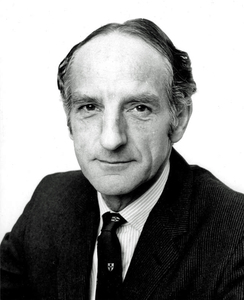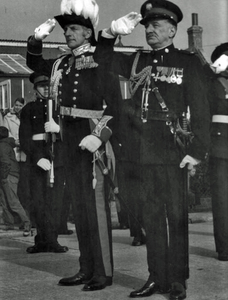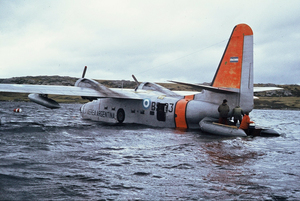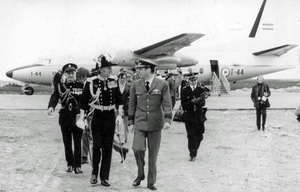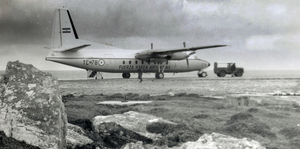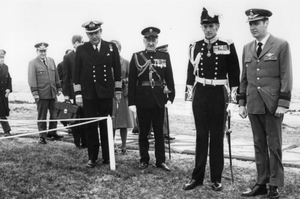LEWIS, ERNEST GORDON (Toby)
1918 - 2006 from New Zealand
governor, was born in Dunedin, New Zealand on 26 September 1918, the son of George Henry Lewis. He was educated at Otago Boys' High School and Otago University. He served with the Second New Zealand Division in the Middle East from 1939 to 1946. He attained the rank of lieutenant-colonel, was mentioned in despatches and awarded the MBE. He joined the Colonial Service in Nigeria in 1947, and was administrator of the Turks & Caicos Islands from 1955 to 1959, returning to Nigeria where he was permanent secretary to the Federal Ministry of Economic Development from 1960 to 1962. He had married Jean Margaret Smyth in 1949.
Lewis joined the CRO (subsequently FCO) in 1962 where his first appointment was as first secretary in Pakistan from 1963 to 1966. From 1966 to 1969 he served in London, becoming first secretary in Kuching, Sarawak from 1969 to 1970, after which he was appointed governor of the Falkland Islands.
Governor
Lewis arrived in the Islands on 8 January 1971 and left on 20 January 1975 after just over four years as governor. On his departure the Falkland Island Times noted that he had worked in the Islands 'during a turbulent period in world and local affairs'. In terms of the relationship with Argentina the period was certainly eventful, covering the various stages in the evolution of the Communications Agreement and the further developments which followed it. While the issue of Argentina was central, there was also some exploratory developmental activity, and against a background of fluctuating wool prices and rising costs there were successful efforts to prevent the Falklands requiring budgetary aid from the UK. There was a continual struggle to attract good professional staff from outside the Islands.
The Air Link with Argentina
One of Lewis's early tasks was to reveal more details of the exploratory talks held between a British delegation including three Falklands representatives and Argentina in London in July 1970, principally but not exclusively about communications, in particular the possible inauguration of an air service with the mainland. The response in the Islands was mixed, with fears expressed that such arrangements might be a preliminary to an Argentine take-over.
In the meantime there had been a report by Peat, Marwick & Mitchell recommending an air service in combination with a sea service. In June 1971 DA Scott, an under-secretary in the FCO led a British delegation, again including representatives from the Islands, in further talks in Buenos Aires. This was preceded by a visit to the Islands by Scott and his FCO team during which Scott was at pains to persuade Islanders of the advantage of air links and to reassure them that any arrangements would be under 'the sovereignty umbrella'* protecting Britain's position on the sovereignty of the Islands. The result of the talks was a Joint Statement under which the Argentines would provide a regular air service to be operated by amphibian aircraft pending the building by HMG of an airfield at Port Stanley for medium range passenger aircraft. There were various important additional administrative provisions, including the unpopular 'white card' for travel by Islanders to Argentina and the offer of scholarships in Argentina to children from the Islands. A sea service by the Falkland Islands Company would also be maintained, although the Darwin which had traditionally provided the link with the mainland was withdrawn by FIC as uneconomic in December 1971.
The amphibian aircraft started service on 8 January 1972 but, given weather conditions, its limited payload, and high operating costs, it was soon decided to replace it with land planes. The Argentines offered to build an aluminium landing strip for this purpose. The proposal ran into local opposition mainly on the grounds that the strip would be an encroachment on sovereignty. As Lewis said in a despatch 'the local politicians, not known for their ability to stand up to pressure, immediately took cover and we found the road ahead blocked'. It took extensive touring of the settlements by Lewis and his colonial, later chief, secretary LAYNG, to swing Island opinion in favour of the proposal to which councillors eventually agreed unanimously. Work began in May 1972.
The opening and inaugural flight took place in November 1972. Despite the good impression created by the Argentine workforce employed on the construction of the strip, Lewis was confronted with the prospect of a demonstration on sovereignty by hardliners at the inaugural ceremony which was to be attended by numerous Argentine visitors, including press. This was only prevented by Lewis's persuasiveness, by a broadcast by a member of LegCo and by tight security measures. The ceremony went well and a further successful round of communications talks on the Islands dealt with related administrative and political problems.
Lewis's despatch of 24 November 1972 in which he had described his success in preventing the demonstration against the strip also expressed pleasure at the extent and pace of the change in the attitude of Islanders generally to the Argentines, although he acknowledged Islander concern about the proposal to have Argentina become exclusive supplier of fuel to the Falklands, what was to become known as the YPF Agreement (after the name of the Argentine state fuel company) which was beginning to be discussed. Lewis, however, was careful to warn that the 'relaxed atmosphere makes it even more important that a calculated decision is taken in the months ahead as to whether we allow the present momentum to be maintained or where a touch on the brake is necessary'.
At any event a Peronist triumph in the March 1973 Argentine elections was to produce an immediate hardening of the Argentine line. Further inter-governmental talks, largely to discuss the operation of the Communications Agreement between Britain and Argentina in April 1973, foundered. The Argentines wanted to reintroduce the 1968 Memorandum of Understanding into the discussions and to exclude Island representatives. FCO officials at the meeting were unable to accept discussions on such a basis at such short notice, needing to consult ministers.
In mid-1973 Lewis came home on leave and was asked to advise on the dilemma which now confronted HMG. As the FCO saw it, the Argentines had taken advantage of the relationship created by the Communications Agreement to manoeuvre for a breakdown by reviving the contentious 1968 plan. Argentina was trying to bring about a settlement before Island opinion had had time to evolve further in their favour. HMG on the other hand were anxious to maintain the dialogue in whatever way they could and avoid confrontation. Shortly before Lewis's meeting, scheduled by the FCO to discuss 'an acceptable method of continuing the dialogue with the Argentines over the future of the Falkland Islands', a telegram from Chief Secretary Layng arrived stating, inter alia, that 'to all but a hard core [of Islanders] pounds, shillings and pence mean more than Britishness' and suggesting that most people would in the end realise that they would be better off 'in an Argentine development area'. Determined efforts by both sides should be able to produce a formula acceptable all round. Asked about the telegram Lewis, rather surprisingly, agreed generally with it but had some reservations about its assessment of a change of heart by Islanders. He said he would have to see what people thought when he got back. He was nervous about going into talks 'with so few cards to play'.
The FCO hankered after reintroducing guarantees and safeguards as a way of keeping the Argentines in play, perhaps by way of a further discussion document, but accepted that ExCo should be consulted. Lewis felt 'quite a lot of patient discussion would be needed to persuade Islanders to keep the dialogue going on this basis and that they would not be ready to transfer their allegiance for ten or twenty years'. He rejected the possibility of a referendum which had been raised by FCO on the grounds that it would be difficult to frame the questions.
Following reference to ministers, the issue of whether there should be a discussion about guarantees and safeguards was put by Lewis to all councillors on his return stressing that HMG had no intention of influencing Islanders in any way. On 25 October 1973 councillors agreed unanimously that, though dialogue should continue, it would be wrong for HMG to take the initiative. They expressed the view that despite all the benefits of the increased contacts with Argentina a majority of Islanders would vote to stay British. Strangely, in view of the reservations, which he had expressed in London, Lewis raised the possibility of a referendum 'at some stage'.
The Condominium Idea and the YPF Agreement
The notion of a joint Anglo-Argentine condominium next engaged the FCO as a possible way ahead which might be acceptable to Islanders. As it happened Chief Secretary Layng had worked in the Anglo-French Condominium of the New Hebrides in the Pacific and was able to explain its workings to councillors. It was not a particularly attractive solution from an Argentine point of view and it once again ducked the sovereignty question. It was Lewis's view that the Argentines should be asked whether they would agree to talks on this basis before the idea was put to Islanders. However, with a change to a Labour Government in the UK following the General Election of February 1974, it was decided that Lewis should consult ExCo about the proposal and that he should feel able to warn them about the dangers of refusing to talk. On 7 June councillors agreed that there was no objection to preliminary talks provided that they were not expected to take part. On 11 June the proposal was put to the Argentine Foreign Minister, Vignes, who after consultation with Peron agreed to talks about a joint administration as a period of integration for Islanders before transfer of sovereignty.
Unfortunately for the FCO, the condominium idea was encountering increasing resistance in the Islands encouraged by the Falkland Islands Committee in London, formed to support Falklands interests. Both Lewis and the British Ambassador in Buenos Aires, Sir Donald Hopson, were keen that talks should take place, if necessary without Islands representation, but James CALLAGHAN, the Foreign Secretary, thought there was no point in proceeding without Islander participation. Sadly, Hopson died before he could give the Argentines this information and it was uncertain whether his deputy had made the changed position plain. At any rate it was pursued no further. The FCO's next bright idea, leaseback, only gathered momentum after Lewis's departure.
In the meantime, steps towards implementation of the YPF Agreement were taking place, apparently without regard to the stand-off in general relations with Argentina. The Argentines had proposed in September 1973 that their state oil company YPF should supply petroleum products to the Islands at mainland prices on a monopoly basis. They already had a tank farm to supply fuel to the Argentine aircraft operating from the strip and were prepared to build further bulk storage facilities. To ease things, an agreement had been signed in September 1974 to place all commercial transactions with Argentina under a 'sovereignty umbrella'. Lewis had gone to considerable lengths to defend the proposed agreement in his address to LegCo on 4 January 1974. He particularly stressed the price advantage, a likely drop in the price of petrol from 82 pence to 36 pence a gallon, and in diesel from 32 to 23 pence. He said 'The Government, quite frankly, does not like monopolies or economic dominance by any company but we do have to face the facts of life.' The Falkland Islands Company who had long collaborated with the Ministry of Defence in supplying most of the fuel in the Islands were deeply opposed to the change and protested to HMG, with the support of the Falkland Islands Committee, that councillors had been misled and that the installation was unsafe. Their objections were overtaken by the change of Government in London in February 1974. Both the Argentine and the UK Governments appear to have been equally keen to sign the Agreement despite the deterioration in their relations. Lewis emphasised to LegCo the role of the Agreement in strengthening relations with Argentina. It certainly strengthened Argentina's economic influence and involvement in the Falklands.
Administration and Development
Lewis did not allow himself to be distracted by external affairs from taking an active interest in the internal government of the Falklands. It appears that he had been given a brief by the FCO to modernise FIG. He began by focussing on the Falklands' difficult financial plight 'caught in the classic squeeze situation of falling prices' for their sole export, wool, and 'rising prices for imports (Legco 17 May 1971), resulting in regular budget deficits and reliance on their reserves to balance the books'. He spoke of the need to scrutinise estimates of expenditure more closely than hitherto and 'to take a fresh, hard look at all established institutions'. The wool price rose steadily from the catastrophic figure of 33·5 pence per kilo in 1971 to 110·5 pence per kilo in 1974 but Lewis continued throughout his time to argue for budgetary stringency. In particular he emphasised the undesirability of allowing the Falklands to require grant in aid from the UK, underlining the degree of scrutiny which this would involve. By the time he left, the Falklands were producing a budgetary surplus, avoiding the need to plunder their reserves and banishing the spectre of grant in aid. This was partly the result of better wool prices but, more significantly, reflected increased revenues, unpopular but necessary increases in taxation and better control of costs.
The modernisation process involved both financial prudence and organisational and administrative change. The chief secretary was relatively young and had a remit to support Lewis in his modernisation brief. This he did with great energy, attracting an unpopularity which Lewis seems generally to have avoided. Lewis paid tribute to him (LegCo, 4 June 1974) for 'having done so much to streamline the administration of the Government machine and improve its efficiency'. The Stanley Town Council was abolished and its tasks distributed amongst other departments. The Medical Department was centralised in Stanley with the introduction of the equivalent of a flying doctor service and Darwin Secondary School was closed, to be replaced by a boarding hostel. Virtually all FIG departments were examined by experts supplied by the Overseas Development Administration.
It was not all pain. Farms benefited from the first Five Year Development Plan under which grants were made as fencing subsidies to improve land management. Lewis was personally instrumental in promoting the Sedgwick Report, by another overseas expert, which reviewed and increased civil service salaries by between 17% and 40% to keep up with the cost of living, though its recommendation that civil servants should no longer be entitled to leave passages to the UK but only to the mainland was unpopular. Lewis helped to introduce the Overseas Service Aid Scheme to the Falklands which paid inducements to expatriate professionals and specialists, enabling the Islands to attract much needed doctors, teachers, nurses and technical experts.
After a year in office Lewis decided that the Falklands practice of having joint meetings of the Executive and Legislative Councils would cease and the two Councils should in future have separate meetings. He thought the joint system inhibited public debate in LegCo because so much had been decided in meetings of Joint Council. He also urged ExCo members to be more forthright in defending policies which they had agreed rather than taking refuge in the confidentiality of their meetings.
Economic progress, as always in the Falklands, was to some extent an affair of false starts, wheels reinvented and hopes deferred. A major disappointment of Lewis's time was Alginate Industries' decision not to pursue their scheme for large-scale kelp processing but trial fishing by Taiyo began and high hopes rested on a report by Dr Leslie Stewart on the prospects for an inland trout fishery. A first consignment of 20,000 sheep was exported to the mainland. A new power station was opened in Stanley. There were promising increases in the number of tourists. Most important of all was probably the eventual commitment of £4·2 million by British Aid for the building of Stanley Airport, a commitment under the Communications Agreement with Argentina.
In general Lewis appears to have coped well with the successive changes and chances of his period of office. Invariably loyal to FCO policy on Argentina as the FCO twisted and turned to keep the Argentines in play, he seems to have gone to considerable pains to explain the rationale for each new step to Islanders, albeit making a virtue of necessity. Whilst doing everything possible to run the Islands better, he appeared genuinely to think that contact and collaboration with Argentina on the lines of the Communications Agreement was the best way ahead. He was at the same time mindful of Islands opinion and firm on sovereignty. As he said in LegCo on 4 January 1974 'I stand for a community which, while safeguarding its sovereignty, is prepared to play its part in the world, particularly with our closest neighbour, Argentina, and with other countries in the great Latin American continent.'
Lewis was deaf and described as having 'managed this with utmost diplomacy and skill', seemingly sometimes using it to advantage. He was generally liked, an excellent host who enjoyed entertaining with his wife, known as 'Lady Lou'. Although he appeared frail, he took early morning walks on the racecourse where he despatched golf balls hither and yon with great gusto.
He returned to the FCO as head of the Gibraltar and General Department, retiring in 1977. He was appointed OBE in 1958 and CMG in 1972. His wife died in 2003 and he died in London on 29 December 2006.
External links
See: Visit of FCO officials to the Falkland Islands for talks with Gordon Lewis, Governor. (Records held at the National Archives, Kew)
Comments
Revisions
July 2019 Four additional photographs added
February 2020 One external link added
